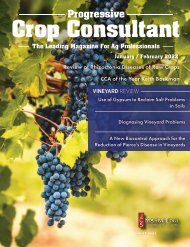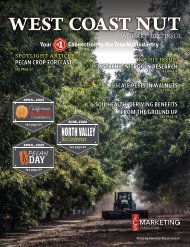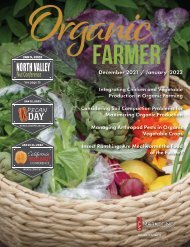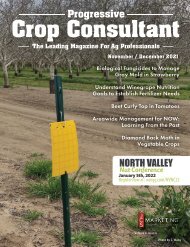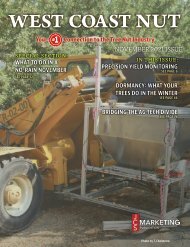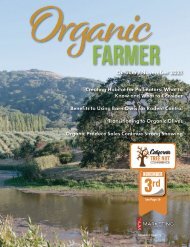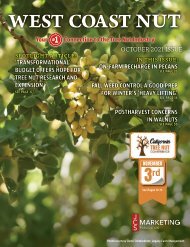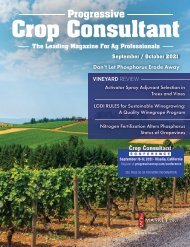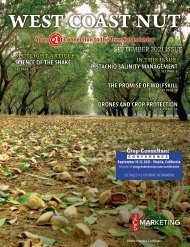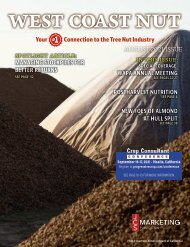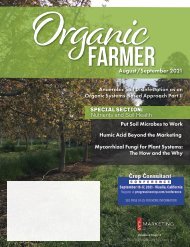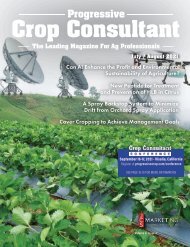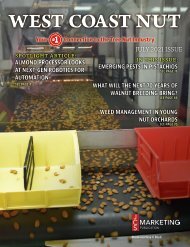WCN Dec e
Create successful ePaper yourself
Turn your PDF publications into a flip-book with our unique Google optimized e-Paper software.
California Legislative<br />
Recap for 2021<br />
By ROGER A. ISOM | President/CEO, Western Agricultural Processors Association<br />
This year’s budget includes $90 million in General Funds over the next two years for the Department of Pesticide Regulation (photo by Cathy Merlo.)<br />
The 2021 legislative session was an<br />
interesting one, still subject to<br />
COVID-19 restrictions limiting<br />
access to the Capitol, but bolstered by<br />
a big surplus budget. All in all, things<br />
could have been far worse. The following<br />
is a brief summary on the bills we<br />
felt were most important to the tree nut<br />
industry during this year’s session.<br />
AB 73 (R. Rivas)<br />
Current law requires the State Department<br />
of Public Health and the Office<br />
of Emergency Services to establish<br />
a personal protective equipment (PPE)<br />
stockpile, and requires the department<br />
to establish guidelines for the procurement,<br />
management and distribution of<br />
PPE, taking into account, among other<br />
things, the amount of each type of PPE<br />
that would be required for all health<br />
care workers and essential workers as<br />
defined in the state during a 90-day<br />
pandemic or other health emergency.<br />
This bill would specifically include<br />
wildfire smoke events among health<br />
emergencies for these purposes and<br />
would include agricultural workers in<br />
the definition of essential workers. The<br />
bill passed out of the Assembly 78-0,<br />
passed out of the Senate 37-0 and was<br />
signed by the Governor on Sept. 27.<br />
AB 284 (R. Rivas)<br />
This bill would require the State Air<br />
Resources Board, as part of the next<br />
scoping plan update and no later than<br />
Jan. 1, 2023, to identify a 2045 climate<br />
goal with interim milestones for the<br />
state’s natural and working lands,<br />
and to integrate into the scoping plan<br />
update recommendations developed<br />
by the Natural Resources Agency and<br />
the Department of Food and Agriculture<br />
regarding practices, policy and<br />
financial incentives, market needs and<br />
potential reductions in barriers that<br />
would help achieve the 2045 climate<br />
goal among other recommendations.<br />
The bill was moved to the Inactive File<br />
and may be acted upon in January 2022.<br />
AB 377 (R. Rivas)<br />
This bill would require, by January<br />
1, 2023, the State Water Resources Control<br />
Board and regional boards to prioritize<br />
enforcement of all water quality<br />
standard violations that are causing<br />
or contributing to an exceedance of a<br />
water quality standard in surface water<br />
of the state. The bill would require the<br />
state board and regional boards, by<br />
January 1, 2025, to evaluate impaired<br />
state surface waters and report to the<br />
Legislature a plan to bring all water<br />
segments into attainment by January 1,<br />
2050. The bill was held on the Assembly<br />
Suspense File and may be acted upon<br />
January 2022.<br />
AB 567 (Bauer-Kahan)<br />
Current law generally regulates<br />
pesticide use by the Department of<br />
Pesticide Regulation and requires the<br />
Director of Pesticide Regulation to<br />
endeavor to eliminate from use any<br />
pesticide that endangers the agricultural<br />
or nonagricultural environment.<br />
A violation of those provisions and<br />
regulations adopted pursuant to those<br />
provisions is generally a misdemeanor.<br />
Current law requires the department<br />
on or before July 1, 2018 to issue a determination<br />
with respect to its reevaluation<br />
of neonicotinoids and to adopt<br />
control measures necessary to protect<br />
pollinator health within two years, as<br />
specified. This bill would prohibit the<br />
use of a neonicotinoid on a seed, as<br />
specified. The bill was made into a<br />
two-year bill and may be acted upon in<br />
January 2022.<br />
AB 616 (Stone)<br />
This was the big bill of the session.<br />
Current law requires the Agricultural<br />
Labor Relations Board to certify the results<br />
of an election conducted by secret<br />
ballot of employees in a collective bargaining<br />
unit to designate a collective<br />
bargaining representative, unless the<br />
board determines there are sufficient<br />
grounds to refuse to do so. Current<br />
law further provides that if the board<br />
refuses to certify an election because<br />
of employer misconduct that would<br />
render slight the chances of a new election<br />
reflecting the free and fair choice<br />
of employees, the labor organization<br />
shall be certified as the bargaining<br />
representative for the bargaining unit.<br />
This bill would refer to the secret ballot<br />
election as a polling place election. The<br />
bill passed out of the Assembly 50-17,<br />
passed out of the Senate 24-11, but was<br />
vetoed by the Governor on Sept. 22,<br />
2021.<br />
AB 1395 (Muratsuchi)<br />
The California Global Warming<br />
Solutions Act of 2006 requires the State<br />
Air Resources Board to prepare and<br />
approve a scoping plan for achieving<br />
the maximum technologically feasible<br />
and cost-effective reductions in greenhouse<br />
gas emissions and to update the<br />
scoping plan at least once every five<br />
years. This bill, the California Climate<br />
Crisis Act, would declare the policy of<br />
the state both to achieve net zero greenhouse<br />
gas emissions as soon as possible,<br />
but no later than 2045, and achieve<br />
Continued on Page 80<br />
78 West Coast Nut <strong>Dec</strong>ember 2021




